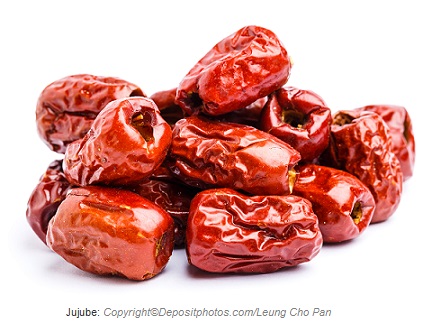Jujube is also known as Chinese date, Indian date, and Korean date. It is edible either  fresh or most commonly dried. Every 100 grams of dried jujube contains 74 grams of carbohydrates and 4 grams of protein. This fruit is very poor in fiber.
fresh or most commonly dried. Every 100 grams of dried jujube contains 74 grams of carbohydrates and 4 grams of protein. This fruit is very poor in fiber.
Average calories: 312 per 100 grams of dried jujube.
|
Jujube: 100 grams, dried |
|
|
Carbohydrate |
74 |
|
Fiber |
1 |
|
Protein |
4 |
|
Fat |
0 |
|
Calories |
312 |
Vitamins found in higher amounts: vitamins B1, B2 and C.
Minerals found in higher amounts: manganese, iron, potassium, and phosphorus.
Phytonutrients found in higher amounts and their health benefits: the four important phytonutrients in jujube are puerarin, apigenin, ziziphin, and mucilage.
Puerarin is an isoflavone with antioxidative ability that may reduce cholesterol level and the risk of cardiovascular diseases. It has also a blood-thinning effect and may help with non-alcoholic fatty liver as well.
Apigenin is a flavonoid found in artichoke, parsley, celery and chamomile tea as well and can block the liver enzyme Cytochrome P450 2C9, which is responsible for the metabolism of many medications.
It is also claimed that apigenin may stimulate the growth of the nerve cells. This is why apigenin might be beneficial in Multiple Sclerosis (MS). It possessesantioxidative, anti-inflammatory, and anti-cancer properties, helping to reduce the risk of cancer and allergies.
Traditionally, jujube is used to relieve stress, chronic constipation, flu, sore throat and common cold.
Ziziphin is a triterpene glycoside that blocks the ability to feel sweet taste.
Jujube contains a glycoprotein called “mucilage”, which has anti-inflammatory activity in the gastrointestinal system by covering the mucous membranes and protecting them from getting irritated. Mucilage is found in higher amounts in flaxseed, kelp, okra, psyllium, and aloe vera.

